Review for Fullmetal Alchemist: Brotherhood - Part 1 (2 Discs)
Introduction
If it ain't broke, then don't try and fix it. That's a truism that I ascribe to, which is why I scratched my head with more than a degree of consternation when I heard that Studio Bones was going to remake the Fullmetal Alchemist story from scratch. The first Fullmetal Alchemist series was released here in its entirety a few years ago, followed up by the Conqueror of Shamballa movie, and even after this much time, I still consider it one of the best anime series ever made. It was a gripping and epic tale, set in a richly drawn universe full of compelling characters. This tale of alchemy was magic with consistent rules, the search for redemption, and a story where twist followed turn, revelation compounded on revelation to provide an anime experience that I still find breathtaking today. It seemed to me that the only possible reason for remaking it would be to take advantage of a widescreen ratio, which seems scant justification for such an outlay of effort. Then I learned that the first Fullmetal Alchemist series was itself incomplete. The creators followed Hiromu Arakawa's original manga for the first half, but then when the manga ran out, they got permission to create their own story to conclude the series. I think it's one of the rare times where such a decision has paid off, as the story they concocted was stunning. Normally such developments lead to Naruto-loads of filler, or the conclusion of Gantz.
However, since the first series, Hiromu Arakawa has concluded the Fullmetal Alchemist story in manga form, and with that in mind, it actually seems logical to animate the Fullmetal Alchemist story anew, giving it a widescreen and HD polish in the process. Fullmetal Alchemist: Brotherhood is the manga story, adapted into some 64 episodes, and now you can watch the story as the creator intended. I ought to mention, that I'm not a hardcore fan of the manga, and with first Funimation, and then Manga Entertainment streaming the show online, this is one of the few times that I have been able to preview the show before the DVD release. I watched about half of it before developing 'monitor neck', and I do have some issues with the direction the story goes in, and the overall tone of the show. It isn't quite as bad as New Coke, but it is telling that I haven't been able to stick with the online stream of the show. But, watching it on television is a whole other experience, and I'm hoping to pick up more nuance to the show than I did originally.
Alchemy is the art of the transmutation of matter by means of an incantation, a mystical circle, or sheer willpower alone. For centuries charlatans and the deluded pursued the creation of gold by alchemical means but to no avail. But in Full Metal Alchemist, alchemy is a realised science. Set in an alternative world during the early years of the twentieth century, the transmutation of elements is indeed a reality, and the state regards such talent highly indeed. Full Metal Alchemist tells the story of brothers Edward and Alphonse Elric, two precocious alchemists who are on a quest. The young brothers had attempted the unspeakable, resurrecting their mother. But the Law Of Equivalent Exchange cannot be flouted, only objects of equal mass can be transmuted, and the dead cannot be brought back to life. The attempt failed disastrously. Now, Alphonse is a disembodied spirit bound to a suit of animated armour, while Edward has replaced his leg and arm with metal automail, but it's his prodigious facility with alchemy that has earned him the name, Fullmetal Alchemist. Now they search for a means to restore their bodies.
This first collection of Fullmetal Alchemist Brotherhood comes with 13 episodes across 2 discs from Manga Entertainment. Also, this is the first mainstream anime series in the UK to be released simultaneously on Blu-ray and DVD, although it must be noted that Brotherhood was broadcast as a 540 source in Japan, and all of the Blu-ray releases worldwide involve a degree of upscaling. Also, both the Madman and Funimation Blu-rays have player forced subtitles in the Japanese audio to deter reverse importation in Japan. I don't know if the Manga discs will be the same though. There are none of these issues on the DVDs of course.
Owners of the first series should be aware that most of this first collection would be repetition for them. In essence with a few significant differences, these thirteen episodes, with a lot of judicious edits and restructures and omissions, retell the story from the first half of the first series. Twenty-six into thirteen does go, if you push it. Skip to Page 3 if you want to avoid the episode synopses.
Picture
It may not be a Blu-ray, but Fullmetal Alchemist Brotherhood gets a very fine 1.78:1 anamorphic transfer on DVD, NTSC-PAL issues not withstanding. The image is clear, sharp and colourful, the detail levels are high, and Studio Bones makes sure that the full widescreen scope is put to good use, and the animation is vibrant and energetic. Of course I can't help but compare it to the first series, and you'll have to take my bias into account when I say that I feel something is lacking in this second series. The action animation is better, especially given these five years or so of technical advancement, and I must say that Brotherhood is a much prettier anime to experience. However, I do feel that the show doesn't compete when it comes to detail. Backgrounds seem more generic, character animation is a little simpler and lacks nuance, while the actual character designs are subtly different, a little stockier and broader and not quite as elegant as before. Also, in these first thirteen episodes, there is a whole lot of comedy, meaning that characters are apt to go super-deformed at the drop of a hat, much more so than in the first series, and taking a leaf from the manga, there are a whole lot of comic thought bubbles and graffiti that require signs translations this time around.
Disc 1 suffers from an ill-placed layer change.
Sound
You have the choice between DD 5.1 English, and DD 2.0 Surround Japanese, and I must say that the added surround for the Japanese track is certainly welcome, although of course the 5.1 track is miles ahead when it comes to audio placement. You have the choice of translated subtitles and a signs only track as you would expect. But, just like with the video, I feel a little disappointed in the audio for FMA: Brotherhood. My choice as always is for the Japanese audio, and it is certainly an acceptable way to watch the show. However, if like me, you have become accustomed to the cast of the first series, you may be disappointed to hear that of the main cast, only Romi Park (Ed), and Rie Kugimiya (Al) reprise their roles. I certainly gave more than a few double takes at the odd-sounding Winry and Mustang. It's quite the contrary with the English dub though, as other than Maxey Whitehead taking the place of Aaron Dismuke (whose voice broke) as Al, the majority of the cast return. Something did feel a little off about the dub though, and I put it down to the greater comedy focus in these episodes; I've never been all that fond of English comedy dubs of anime.
But these are small issues, as by far the greatest disappointment in Full Metal Alchemist's audio is the music. Admittedly the themes are good, and the first opening theme by Yui is as good as any of the L'arc en Ciel tracks that the first series used. But the incidental music takes a hit that doesn't do the show any favours. For the first series, Michiru Oshima created a score that was grand, theatrical, and operatic, and very much a character in the show. For Brotherhood Akira Senju provides the background music, and the most I can say about it is that it is bland and forgettable. There were one or two problems that I noticed with the subtitles, a mistake in episode 3 (Ed says "I'm religious" when he should actually say, "I'm not religious"), and one subtitle that strays off the edge of the screen in episode 5, as well a couple of minor typos.
The Episodes
Disc 1
1. Fullmetal Alchemist
The Elric brothers were about to head off to Liore to investigate rumours of a powerful priest, but their mission is postponed when a murderous alchemist arrives in Central. The Freezing Alchemist, Isaac MacDougal was once a State Alchemist, but following the Ishbalan War he left the military and became a rebel. Now he's in Central to kill the Fuhrer King Bradley, and he'll do it by encasing the whole city in ice if he has to. With that kind of power, he may just have the Philosopher's Stone, which is reason enough for Edward Elric and his brother to hunt him down. But as MacDougal's plan unfolds, he has a warning about the country for his diminutive foe, while his actions awaken the attentions of… someone…
2. The First Day
As Ed and Al head to Liore chasing the possibility of a Philosopher's Stone, they are reminded as to what motivates their quest. The death of their mother 10 years previously spurred them to break the ultimate taboo. After years of learning about Alchemy, training from their master, they attempted human transmutation, and paid a tragic price for their hubris. Back in Central, Maes Hughes and the Colonel Roy Mustang dissect the Freezing Alchemist incident, the curious use of Xingese Alkahestry, and Roy relates to his friend just how he came to recruit Edward Elric into the military.
3. City of Heresy
There is a priest in the city of Liore, Father Cornello, who is reputed to perform all manner of miracles, including bringing the dead back to life, all of which appears to flout the law of equivalent exchange. Ed and Al are there to investigate, but things get a little personal when they meet a young supplicant named Rose, who wishes the priest to bring back her dead boyfriend. Of course Cornello is no pious miracle worker, he has a Philosopher's Stone at his command, and Ed and Al have a much better use to put it to. But they aren't the only ones who want the Stone, while Cornello is just a puppet. Someone else is pulling the strings.
4. An Alchemist's Anguish
After seeing Cornello's chimera, Ed and Al realise that they will need to brush up on their live transmutation knowledge if they are to accomplish their goals. Coincidentally, there is an alchemist in East City who is researching chimera, and once managed to create a chimera that could comprehend human speech. His name is Shou Tucker, the Sewing Life Alchemist, and he lives there with his daughter Nina and their dog Alexander. Meanwhile, a serial killer targeting state alchemists in Central has eluded capture. Now Scar is heading to East City.
5. Rain of Sorrows
Following recent events, Ed is suffering guilt and remorse over events he couldn't have anticipated, mixed up with memories of his own attempts to resurrect his mother. It isn't the best time for him to be a target of the State Alchemist hating Scar. Meanwhile in Liore, somehow improbably the priest Cornello is back at work, now inciting hatred and riots in the city. It's all being orchestrated by a figure in black named Lust, and when she hears of Ed's predicament in East City, she realises that she has to protect her 'vital sacrifice'.
6. Road of Hope
Ed and Al head back home to Resembool to get repaired, Ed's automail, and then when he can create an alchemic circle again, Al's armour. On the way they stop off at a town when their bodyguard, Major Alex Armstrong recognises a former State Alchemist, Dr Marcoh, missing since the end of the Ishbalan war. Since his area of expertise was the Philosopher's Stone, Ed's understandably motivated, but Marcoh is reluctant to revisit his past, and other than a few hints, refuses to help Ed. He does point him to the 1st Branch Library in Central though.
7. Hidden Truths
The 1st Branch Library in Central has been burnt down. There are certain things that Lust doesn't want Ed to know about just yet. Little does she know that there are people like Sheska in the world, a bookworm who got fired from the library for spending too much time reading and not enough time working. Sheska has a photographic memory, and she can remember every word of Dr Marcoh's research notes, and after 5 days work she presents Ed with a thousand pages of Marcoh's favourite recipes. It's a cookbook that only an alchemist can decipher though, but the truth is unsettling to say the least. But then Ed remembers Marcoh's hint, to look for the truth behind the truth. It leads the brothers to the abandoned 5th Laboratory.
Disc 2
8. The Fifth Laboratory
The secrets of the Philosopher's Stone lie within the 5th Laboratory, but standing in the brothers' way are two disembodied souls sealed in armour, number 66 a.k.a. Barry the Chopper, and number 48, The Slicer, both convicted serial killers. The Slicer is certainly a match for Ed when it comes to fighting ability, but the outclassed Barry has to play on Al's fears instead. But even if the brothers defeat their opponents, the homunculi Lust and Envy have certain secrets that they don't want Edward Elric to learn.
9. Created Feelings
The battle had a considerable effect on Alphonse, and he's currently brooding with an extreme intensity. Ed on the other hand has to call their childhood friend Winry Rockbell to patch up the automail that she so lovingly created. It's not a reunion that he's looking forward to. But when Al breaks down about his fears, it sows a rift between the brothers. It's a good thing that Winry's there, as she's the only one that can patch things up between them.
10. Separate Destinations
Alex Armstrong and Maes Hughes pay Ed and Al a visit in hospital, but it isn't just to enquire after their health. With what has happened at the 5th Laboratory, the military complicity in the creation of Philosopher's Stones, and the involvement of mysterious people with Ouroborous tattoos, it's turning into a sensitive investigations. Too sensitive, as the Fuhrer King Bradley also pays Ed a visit, and warns everyone to tread lightly, to leave it to him to investigate. It's a sensible suggestion, and Ed and Al decide to visit their teacher in Dublith. When Winry hears that the automail capital Rush Valley is on the way, she invites herself along. But contrary to the Fuhrer's orders, Maes Hughes continues to probe.
11. Miracle at Rush Valley
Just walking into Rush Valley, Winry's in heaven. But not so much Ed, who after having his arm and leg examined by a bunch of automail otaku, winds up getting his silver State Alchemist watch stolen. The prime suspect, indeed the only suspect is a young pickpocket named Paninya, but trailing her back to her home leads to the isolated mountain shack of an automail mechanic, Dominic, who Winry decides to apprentice herself to, whether he wants an apprentice or not. It doesn't look to be a promising start to a working relationship, but Dominic's pregnant daughter goes into labour, Dominic has to rush off to the village to get a Doctor, and it's left to Winry to take charge. Fortunately her parents were doctors. Unfortunately, she only looked at their medical texts as a child because she had no picture books.
12. One is All, All is One
Arriving in Dublith, it's a reunion fraught with peril for Ed and Al, as their teacher Izumi is the sort who beats her lessons into her students, and given their present state, they haven't followed her teachings all that closely, especially the lesson about how One is All and All is One. But after a flashback sequence and a butt-kicking, Ed realises that Izumi committed the same sin that the brothers did. She also knows of one other alchemist who knows about the Philosopher's Stone, Hohenheim Elric, Ed and Al's father.
13. Beasts of Dublith
Searching for clues that might restore their bodies gets the brothers thinking about The Truth. Attempting human transmutation brought them to the door, where both they and Izumi were gifted the truth in exchange for parts of their bodies. It's why Ed and Izumi can perform alchemy without a transmutation circle. But the question is why Al cannot, as obviously he sacrificed more of his body than the others. Izumi suggests that the best chance of restoring their bodies lies in restoring Al's memories of The Truth. But before they can do that, chimeras kidnap Al. A homunculus named Greed is in town looking for the secret of immortality, and a soul transmuted into a suit of armour seems pretty immortal to him.
Extras
Both discs get static menus and a jacket picture.
Disc 1's sole extra feature is an audio commentary to accompany episode 1, featuring Line Producer and ADR Director Mike McFarland (Havoc), Colleen Clinkenbeard (Riza Hawkeye, Rose Thomas), Travis Willingham (Roy Mustang), and Maxey Whitehead (Alphonse Elric). It starts off as one of the usual Funimation chucklefests, but there is more of interest than usual here, with mention of the significant fraction of the cast who are reprising their roles from the first series, the differences in recording and their characters this time around, and of course the Bowl Saga.
Disc 2 gets the textless credits, and a commentary with episode 10 featuring ADR Director Caitlin Glass (Winry), Sonny Strait (Maes Hughes), and Laura Bailey (Lust). When they aren't giggling about healthfood beverages, they do comment on some of the differences between the two series.
Conclusion
Actually, taking a closer look at the first series, it becomes clear that there are story elements and plot lines from the first 33 episodes of that series that crop up again in the thirteen that kick off Brotherhood, or rather 12 as the first episode is all brand new. It's a lot to pack in, and consequently quite a lot has been excised, or rather the creators of that first anime series added a whole lot extra, I'm not sure which. I am sure that having seen these first thirteen episodes of Brotherhood again on television, their natural environment, I am now certain that I by far prefer the first series to the second, although judging by fan response I am in a minority.
In the first series, I feel the animation is better, the character designs certainly are, the music is astounding, and the pacing is more measured overall, giving the story space to breathe and develop. I admit, it's a little unfair to compare it to these first thirteen episodes of Brotherhood though. But I also feel that the story overall is a lot better. There are ideas explored, directions chosen in that first series that Brotherhood hasn't been able to match in the 30 odd episodes that I have seen so far, and it doesn't look as if it will even try. Brotherhood goes in some dark directions (tempered, or I might say hampered by a very broad and in your face comedy style), thematically it does get darker, and in scale it is more epic than the first series, but that first series has an emotional darkness to it, a poignancy and angst that is peerless in its storytelling. For one thing, Brotherhood just can't match the direction that the first series took the homunculi in, the secret of their creation, and how it relates to the sin of alchemists. Then there is the way that the parallel worlds theory was worked into that first plot, and what the actual source of alchemy turned out to be. Against that, Brotherhood just doesn't compare. But really, that is weighing brilliant going on perfect, against great going on amazing. Brotherhood when it eventually gets going is great to amazing, and once you can set it aside from the first series and watch it on its own merits, there is a lot to love about this show. It's just that it doesn't get going in these first thirteen episodes.
What we have here are thirteen, or rather twelve episodes that will be unfavourably compared by fans of the first series, and will be the Readers' Digest version for everyone else. It's about getting through the common material as quickly as possible to get to the new material, without compromising the story. In that endeavour it's not entirely successful. It's really a shame that the creators couldn't just say 'watch the original series up to episode 33, and we'll then carry on from there', as while the start of both series have a lot in common, Brotherhood does change the story in small but significant areas, it rearranges the chronology, and it also has some new information to impart that will have an impact when we get to the new material.
Brotherhood does get off to a flying start with a wholly new episode, an action adventure that introduces many of the main characters, with Ed and Al prior to their mission to Liore, having to defend the Fuhrer King Bradley and Central from a rogue alchemist. It's a great way of setting up the world, filling in some background, and showing what all these alchemists are about by having a whopping great battle. Visually it's exciting, it's fast paced, it's entertaining, and it's a great hint of things to come. But not on this collection, as we then have the flashback episode, which takes us from Ed and Al's happy childhood, the loss of their mother, their ill-fated attempt to bring her back, their recruitment by Roy Mustang, their training, all the way to Ed's qualification as State Alchemist. In the first series, this sequence lasted some seven episodes. What we get here is just the highlights package; indeed their poor mother only gets one line. There's no character development or anything too gripping in the story.
However the third episode, City of Heresy is one where the narrative compression works to the show's advantage. It's the story of the brother's adventure in Liore, as they investigate Father Cornello and his Philosopher's Stone. This was originally the two-part story that opened the first series, but here it is squeezed into just one, and the fast pace suits the story well, there's nothing missing, except some character development for Rose, and the absence of her "resurrected" boyfriend. Of course Rose doesn't have the same part to play in Brotherhood, but without the extra weight, the story seems to flow much better. That's not so for An Alchemist's Anguish, which is the story of Shou Tucker and Nina redux. In the original series this was Night of the Chimera's Cry, which was a kick in the guts of an episode, an effective horror, with one of the creepier characters to grace an anime screen in Shou Tucker. It also benefited from a slow build, the characters were introduced in the previous episode, and we got to know them a little more gradually. It's also here that the new chronology hurts the show, as originally this took place during Ed and Al's training, and the events would have been more horrifying to naive children. They're a little older this time around, and what was emotionally wrought the first time, barely raises an eyebrow.
We then jump ahead some eight episodes worth of material to Ed and Al's new first encounter with Scar, which comes before their meeting with Dr Marcoh instead of after, which just like before leads them back to Central and the 1st Branch of the Library. Here again, Brotherhood benefits from a faster pace, telling in two episodes what took five in the original series. Of course there is actually less story to tell here, there's no Scar in the mix at this point, and the homunculi aren't tempting Ed with a Philosopher's Stone either. But the real benefit is that the battles between Ed and Slicer, and Al and Barry the Chopper aren't stretched out over two episodes.
The next two episodes play out much like the originals, with Ed and Al drifting apart through mistrust (although there's no Ishbalan refugee diversion to help bring them back together here) and the trip to Rush Valley, interrupted this time by a birth as well as a pickpocket. The second of the flashback episodes covers the brothers' training under Izumi, and again there is a degree of compression to allow more story in the episode asides from just the flashback. Also, there is no Wrath at this point of the show. It's only at the final episode do things really get intriguing for Fullmetal Alchemist: Brotherhood, although once again it sees Greed kidnapping Al, which while it plays out similarly to the first time around, has a whole other storyline motivating it, Al's search for the truth, and Greed's desire for immortality, and a question about chimera answered that the first series completely forgot to ask.
All the while as we follow the brothers, the show also switches to follow Roy Mustang's arc, Scar's story, and what the homunculi are up to, so we do get a sense of the bigger picture, and yes, once again poor Maes Hughes exits the stage prematurely. But for many of the familiar characters, different fates await them in Brotherhood. Shou Tucker was one of the creepiest antagonists in the first series, but I doubt he will make as much of an impact in this one, while Dr Marcoh is certain to have a bigger part to play in the storyline, as will Greed to a lesser extent, a character that I thought was wasted the first time around.
I'm not too sure what the intent with these first thirteen episodes of Brotherhood is. Standing alone, it's a fair to middling telling of the start of the story, too much information in too little a space, embarrassingly fast as if eager to get to the new material at the expense of the build up. It's as if they expect everyone to have seen the first series, and really only made this bit over again because the story differs slightly but significantly, and those points have to be put across regardless of the repetition. You will get the story by watching these episodes, but it's as if the show acknowledges that the definitive version of the brothers' childhood is in the first series, as is the best version of Shou Tucker and Nina's story, and so on and so forth. Indeed, one character introduced in the final episode, Yoki has a history barely acknowledged in this series, but whose story you can see in its entirety in the first, yet that really helps in explaining what motivates his attitude to the brothers here. But, you won't learn about Xinghese Alkahestry in that version, the differences in some of the characters won't be there; you won't get the hints about 'Father' or the glimpses of Hohenheim.
These first thirteen episodes really do feel like a highlights package, albeit a very well accomplished one. I get the feeling though that they are aimed at fans of the first series, or rather more evidently of the manga. If you've seen the first series you'll have the background knowledge of the characters and the world to get the most out of this collection. Ironically, if you have seen the first series, you may be the most liable to compare this set unfavourably to that. Fullmetal Alchemist Brotherhood Part 1 is to an extent a necessary evil. But bear with this show, because it's about to get better, a whole lot better. 5/10 if you have seen the first series, 7/10 otherwise.
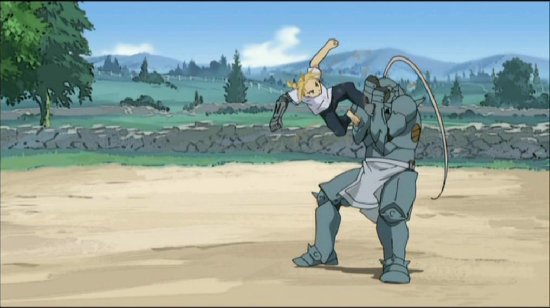
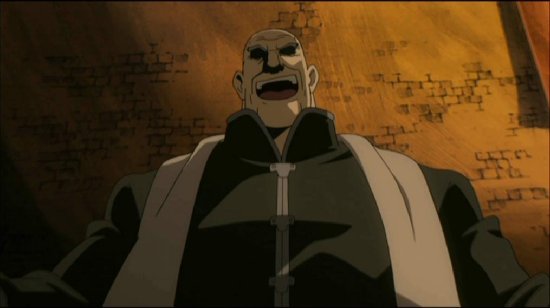
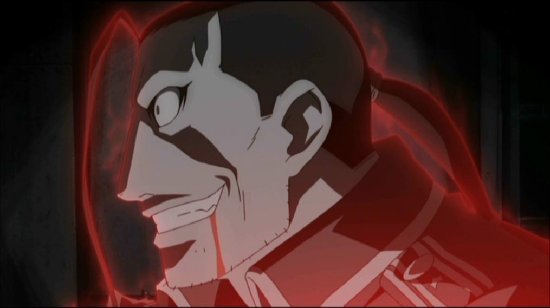
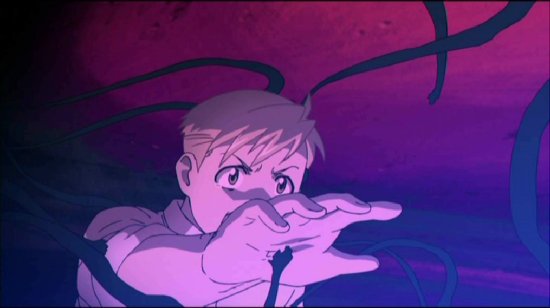
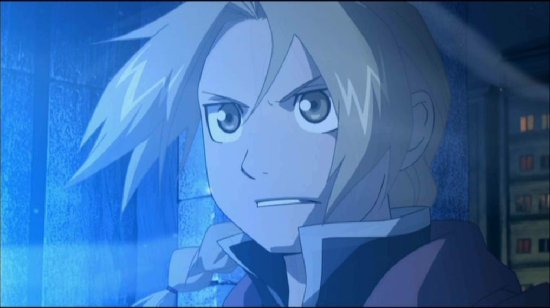
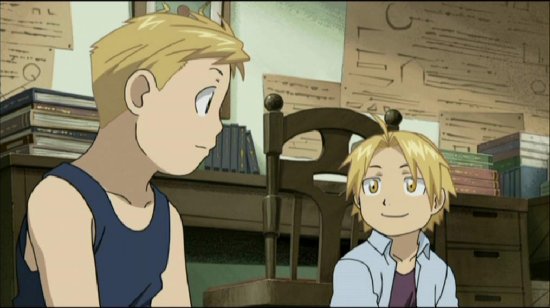
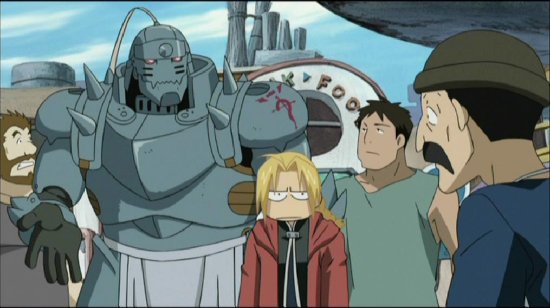
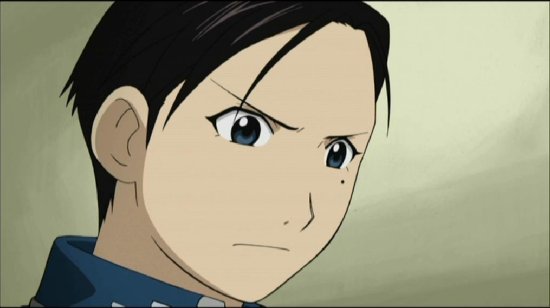
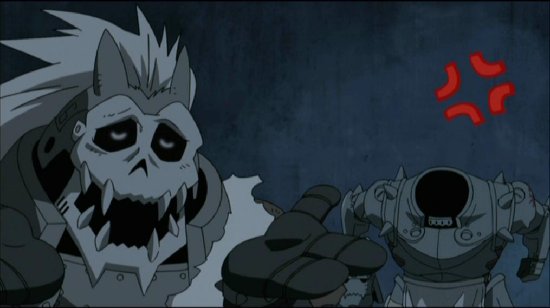
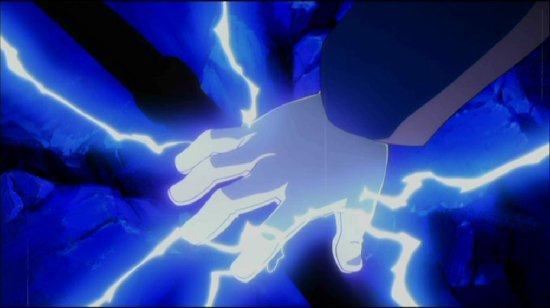
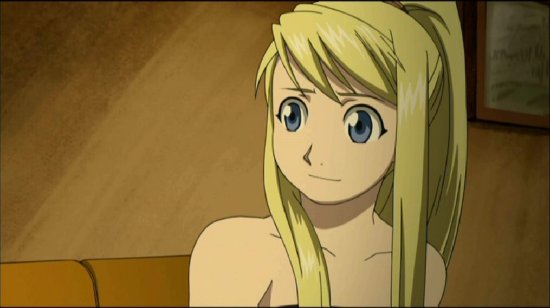
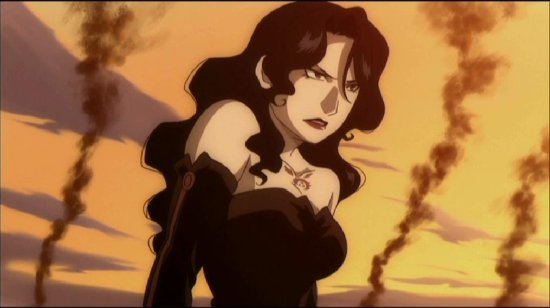
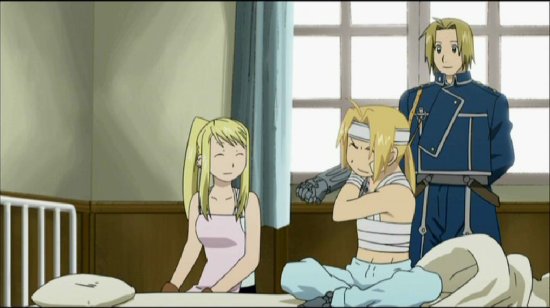
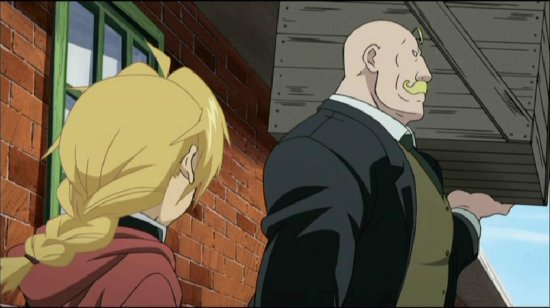
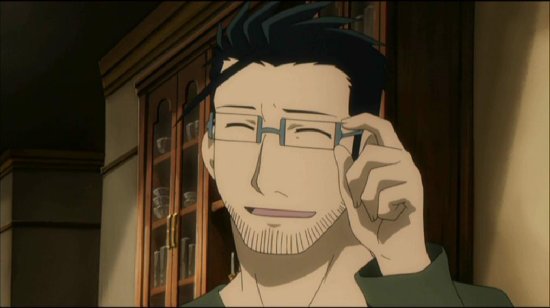
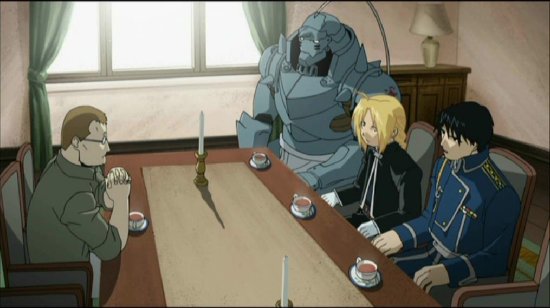
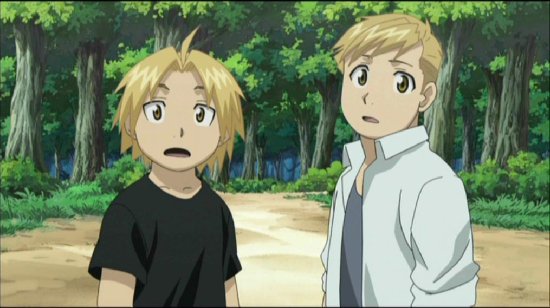
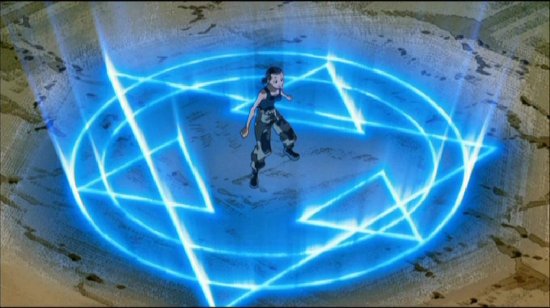
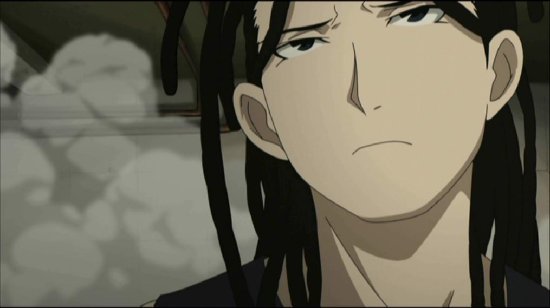
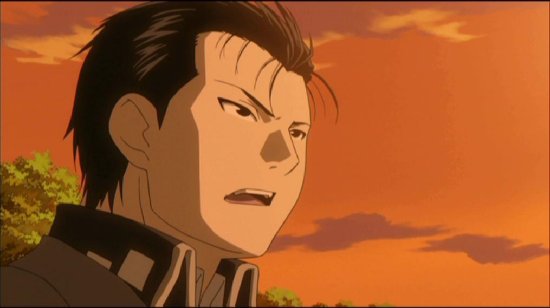
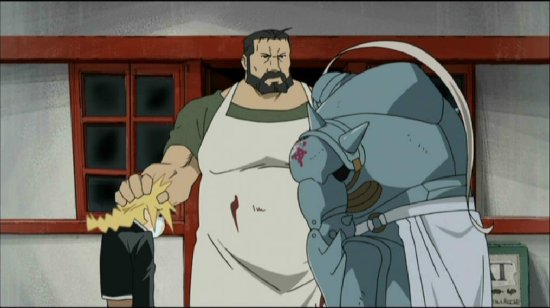
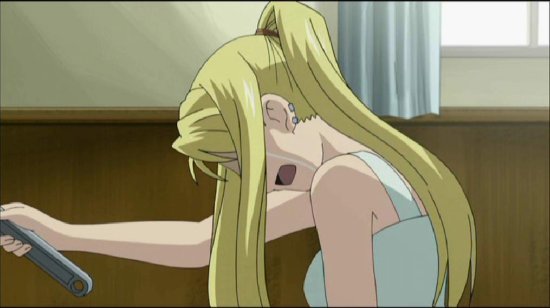
Your Opinions and Comments
Be the first to post a comment!